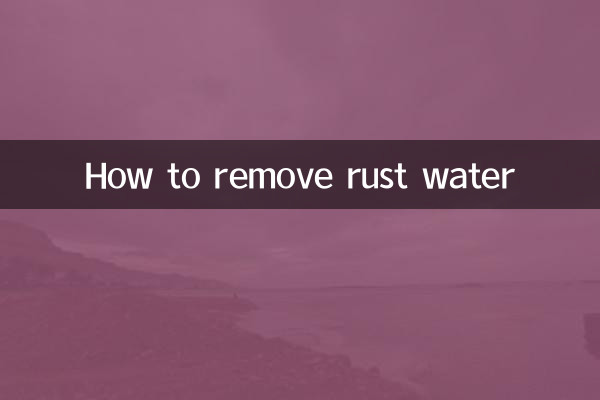How to remove rust water
Rusty water is a common problem in everyday life, especially in older pipes or metal appliances. Rust not only affects water quality but can also pose a potential threat to health. This article will introduce in detail the causes, hazards and various removal methods of rust water to help you completely solve this problem.
1. Causes of rust water

Rust water is mainly caused by the chemical reaction of metal (especially iron) with oxygen and moisture to form iron oxide (i.e. rust). The following are common sources of rust water:
| Source | Description |
|---|---|
| old water pipes | After long-term use, the inner walls of metal pipes rust, causing the water flow to carry rust. |
| water heater | After the internal metal parts corrode, the rust flows out with the hot water. |
| faucet | When metal faucets rust, the rust is mixed into the water. |
2. Dangers of rust water
Rust water not only affects the appearance, but may also cause the following problems to health and daily life:
| Hazard type | specific impact |
|---|---|
| health problems | Long-term drinking of water containing rust may cause gastrointestinal discomfort or accumulation of heavy metals. |
| clothing dyeing | Rusty water during laundry may cause clothes to turn yellow or leave rust stains. |
| Utensils damaged | Rust can clog pipes or damage appliances (such as washing machines, water heaters). |
3. How to remove rust water
For rust water problems in different scenarios, the following methods can be used to solve them:
1. Remove rust from household water pipes
| method | Operation steps |
|---|---|
| Citric acid cleaning | Dissolve citric acid in warm water, pour it into the pipe and let it sit for 1 hour before rinsing. |
| baking soda + vinegar | Mix in a 1:1 ratio, pour into the pipe and react for 30 minutes before rinsing. |
| Professional rust remover | Purchase pipe rust remover and use according to instructions. |
2. Remove rust from the surface of faucets or appliances
| method | Operation steps |
|---|---|
| Toothpaste wipe | Apply toothpaste to rust stains and wipe repeatedly with a soft cloth. |
| potatoes+salt | Dip a cut potato in salt and wipe away the rust. |
| rust removal paste | Purchase metal rust remover paste, apply it and let it sit before rinsing. |
3. Drinking water rust filtration
| method | Description |
|---|---|
| Install water purifier | Choose water purification equipment with rust filtration function. |
| Activated carbon filtration | Use activated carbon to absorb rust particles in water. |
| precipitation method | Let the water stand for a few hours, and then take the upper layer of clean water after the rust has settled. |
4. Measures to prevent rust water
In addition to rust removal, prevention is more important. The following are effective ways to prevent rust water:
| measures | Implementation method |
|---|---|
| Replace pipes | Replace old metal pipes with PPR or PVC pipes. |
| Regular maintenance | Check the internal condition of water pipes and water heaters annually. |
| Use rust inhibitors | Apply an anti-rust coating to metal surfaces. |
5. Frequently Asked Questions
Q1: How harmful is rust water to the human body?
A1: The impact of short-term exposure is small, but long-term drinking may cause iron overdose. It is recommended to handle it in time.
Q2: Which rust removal method is the most economical and affordable?
A2: The baking soda + vinegar or citric acid method can be used at home, which is low-cost and safe.
Q3: Can rust water be used directly to water flowers?
A3: Not recommended. Some plants are sensitive to iron and may affect their growth.
Through the above methods, you can effectively solve the rust water problem. If the problem is severe or persistent, it is recommended to contact a professional maintenance person to inspect the ductwork.

check the details

check the details